October 2, 2025
SEOUL – The number of children prescribed antidepressants in South Korea more than doubled in just three years.
New data from South Korea’s national health insurance system shows that 38,303 children aged 7 to 12 were prescribed antidepressants in 2024. That figure has surged 104 percent since 2021, when just 18,769 received such treatment. Prescriptions for teenagers aged 13 to 17 also climbed sharply, up 73 percent over the same period to nearly 99,000.
While teens still account for the majority of child prescriptions, the pace of increase is fastest among elementary school children.
“More children are experiencing emotional disorders earlier than ever,” said Dr. Shin Eui-jin, a child psychiatrist at Severance Hospital in Seoul. “Early academic stress and accelerated learning programs may be part of the problem. Kids are exposed to pressure well before they’re emotionally ready.”
The findings come from data compiled by the Health Insurance Review and Assessment Service, obtained through the National Assembly’s Health and Welfare Committee and first reported Wednesday by local daily Chosun Ilbo. In total, more than 517,000 children and teens under 18 were prescribed psychiatric medication in 2024, including antidepressants, antipsychotics, anti-anxiety drugs and sleep aids.
It marks the first time the figure has crossed the half-million mark.
Cases were significantly higher among girls. Antidepressant prescriptions for female teens jumped 75 percent between 2021 and 2024, from 33,864 to 59,282. Anti-anxiety prescriptions for girls rose 23 percent over the same period.
The rising prescription numbers reflect broader mental health trends in South Korea, where record-high depression rates and mounting concerns about adolescent suicide have prompted calls for urgent national action.
In separate HIRA data released in August, the number of people treated for depression nationwide surpassed 1.1 million in 2024, a 32.9 percent increase from 2020. The steepest rise was among children under 10, whose depression diagnoses more than doubled in just four years.
Suicide among teens is also rising. According to Statistics Korea, 373 people under 19 died by suicide in 2024, up from 317 in 2020. In the first half of this year alone, 180 teens took their own lives.
Experts warn that the crisis is not only worsening but also shifting downward in age.
“Academic and social stress used to begin in middle school. Now, we’re seeing children experience it much earlier,” said Dr. Jung Yoo-sook, a psychiatrist at Samsung Medical Center, told local media. “They’re also being exposed to social media far too soon, and it’s overwhelming.”
A 2023 national survey by the Korea Institute for Health and Social Affairs also found that 1 in 3 children aged 9 to 17 reported not getting enough sleep. Most cited cram schools, homework, and online study as the reason behind their lack of sleep. Nearly 16 percent blamed excessive use of social media or smartphones.
South Korea’s youth mental health crisis is part of a wider global pattern. The World Health Organization reported in September that 1 in 7 adolescents worldwide is living with a mental health disorder.
mjh@heraldcorp.com


